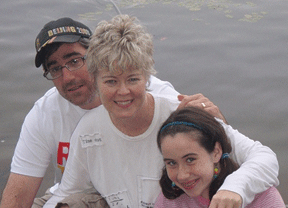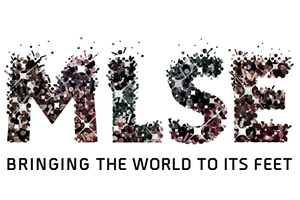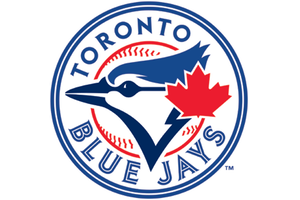By Steve McAllister, President, Sports Media Canada. :
Randy Starkman never took a shortcut in a life that ended far, far too soon.
As the dean of Canadian amateur sports journalists, as a loving husband and father, as someone who made a difference in the lives of young people, and as a friend, Randy tackled it all with his heart and soul. That passion touched people from so many different walks of life, as evidenced by the overwhelming number of tributes that have been published in newspapers, on television and radio, and in blogs from current and former Olympic athletes since the Toronto Star sportswriter died suddenly at the age of 51 on April 16.
“The outpouring of grief from the Canadian sport community has made it abundantly clear just how loved and respected Randy was,’’ wrote Olympic kayaker Adam Van Koeverden the day of Randy’s death after a brief battle with pneumonia. “The media is sometimes seen as an adversary from the perspective of an athlete, but not with Randy. He didn’t just interview us, he talked with us. . . . You see, Randy lived by the same motto as the rest of us. The Olympics isn’t every four years, it’s every single day. He just got it.’’
In a city where Olympic sports usually take a place at the rear of the sports section behind the Maple Leafs, Blue Jays, Raptors, Argonauts and the major North American professional sports leagues, Randy’s excellence gave his beat prominence on A1 and the Sports front. Twice he won National Newspaper Awards for outstanding sports journalism, the first for Ben Johnson’s second steroid scandal, and another one a year later for a story exposing the inadequacies of a popular hockey helmet. The NNAs, which traditionally overlook the best sports journalists in the country in rewarding excellence in sports writing, got it right here. When the Olympics returned to Canadian soil in 2010 for the Winter Games in Vancouver, Randy’s coverage leading up to and including the Games far outpaced the competition. His overwhelming dominance of his beat made him an easy choice to receive the George Gross Award as Sports Media Canada’s sportswriter of the year in 2010.
Randy’s career started in 1980 when he left journalism school at Ryerson to accept a full-time job with United Press Canada. He was hired by the Star after the 1988 Seoul Olympics. While higher-profile beats were offered to him over the last 25 years, Randy always chose to continue covering amateur athletes and the Olympics. He found the best stories to tell about the athletes he covered and he did that by establishing relationships of mutual respect and friendship with many athletes and sports officials. Those friendships never got in the way of Randy telling the truth, but they allowed him to find so many nuggets of information and anecdotes to share with his readers – information and anecdotes that his competitors never saw until they picked up the Star sports section.
“He sought out that something special in athletes,’’ said Olympic cycling and speed skating star Clara Hughes. “Not only did he have the ability to articulate the insights, he often made us realize who we were by his perspectives. He would send me transcripts from interviews he felt offered more than the final edited cuts allowed in the Star because he thought I would find inspiration in a certain athlete.
“He’d be so excited to share and athlete he considered ‘the real thing’.
“He made us understand we were more than our success. That we should strive for more than just being good at what we do. He celebrated the victories and supported through the rough patches.’’
Although he was a man with a heart of gold who didn’t operate on the belief that reporters and athletes would interact almost exclusively in scrums and mixed zones, Randy was a tough, highly principled reporter who could be unrelenting if he didn’t get the information he was seeking. I’ll always remember sitting in a taxi near the Philadelphia airport during my tenure as media relations manager with the National Hockey League Players’ Association in the mid-1990s. I had informed my then-boss, NHLPA executive director Bob Goodenow, that he would be getting a phone call from Randy for a story about helmets. Goodenow didn’t care much for Randy’s questions about why the NHLPA wasn’t more involved in player safety and cut him off fairly quickly into the interview. While Goodenow berated me for allowing him to be “set up”, I thought “Actually, Bob, that’s just my friend doing the job the way it’s meant to be done”.
For all of his excellence as a journalist, Randy’s prowess as a human being far outshone his professional life. His marriage to fellow journalist Mary Hynes, whom he met during his United Press Canada time, was a partnership of two soulmates who were at their best in each other’s company. That love affair resulted in a daughter, Ella, who was Randy’s pride and joy and will carry on her dad’s love for a bad joke, doing good deeds and coming up with new breakfast recipes.
When Randy wasn’t being a loving husband, doting dad and committed journalist, he poured his remaining energy into being a Big Brother, giving many hours to the Dovercourt Boys and Girls Club, contributing to breakfast clubs for neighbourhood schoolchildren. This past Christmas, Randy lent his support to Mary Spencer, helping the London Olympics-bound boxer with a toy drive for underprivileged families in Windsor.
In true Randy Starkman fashion, when he received $10,000 as the recipient of the Dr. Tom Pashby Sports Safety Award in 2008, the cheque was immediately turned over to the Dovercourt Boys and Girls Club.
Randy accomplished all of this despite dealing with depression for most of his life. He battled the disease with the same ferocity as he tackled the toughest story, and was a source of inspiration for others affected by depression and mental illness.
While he would have been embarrassed and a little annoyed by the outpouring of love and tributes in the days following his death, the accolades delivered from people representing so many communities paid homage to a man who lived life to its fullest.







